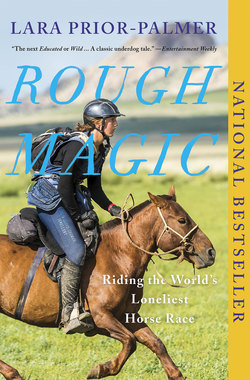Читать книгу Rough Magic - Lara Prior-Palmer - Страница 12
На сайте Литреса книга снята с продажи.
ОглавлениеIV
“You won’t enjoy it.”
I held my tongue.
“Sure,” the voice on the telephone continued, “it’s phenomenal, but the accidents last year were horrific. Google them.”
It was high July when I rang Lucy, a past competitor. Down the line came factual splatter: broken ribs, amputated finger, cracked pelvises, punctured lung, torn ligaments, broken collarbones. On she went as I watched a ladybird crawl up the lamp at my side: bucking ponies, fraying girths, sicknesses, extreme dehydration, getting lost, not fun, don’t expect fun.
I couldn’t just slump there in that dusty Appleshaw chair and roll my eyes. Mongolia was coming for me in a month.
How many riders finished the race during her year?
“I think thirty-five of us started. . . . Seventeen finished.”
I thanked her and said goodbye, feeling my wrist wilt as I dropped the phone back onto the receiver. I wanted to pull out of the race. Summer had swallowed its charm.
In the kitchen I told my older brother Arthur the news as he traipsed on by.
“Oh my.” He shivered and dashed upstairs, relieved not to be me.
I could not pull out of the race—I had paid for it and written letters asking for charitable donations in the name of it—so I let the terror energize me instead. Asked afterwards if I would dare attempt the race again, I’d reply that I could never again be scared enough to do so. The supernatural power of fearing the unknown stunned me into a state of readiness. With four weeks to go, I launched my attack.
Although my application claimed I’d been riding five horses a day, this was fiction. I had been au pairing the toddler in Austria.
“Never too late,” declared Mum as she poured herself another cup of tea.
I volunteered at the local stud, where I began riding three or four horses a day. I also started playing tennis again and running farther than usual. It is a horse’s habit to pace about when she feels a storm approaching. Winding herself up seems to ready her for the coming saga. Now that I’ve forgotten the accompanying terror, I long for the manic flurry of those July days, hopping from horse to horse as I edged towards the race. The whole affair indulged my existence.
Bartramia, a small and racy gray, was the closest creature to a Mongolian pony I could find at the stud. I rode her through all the valleys—even rode her bareback once. Her canter quickened as my calves clung to her full-moon tummy, my boots ripping through the knee-high ragwort. Onwards she flew, a wood ahead, no sign of slowing.
“Woah!” I shouted into the wind at her ears—could I bear this for 1,000 kilometers? “Woah now!”
At the last second she jinked left, braking on the turn as my chest jolted over her shoulders, leaving me hanging on with my thighs as she picked up her gallop again, on up the hill along the rim of the woods.
This was the terrible thrill. Come August I would encounter it atop twenty-five wilder ponies, free of the tightly bound English fields. Our Mongolian ponies would be the descendants of Genghis Khan’s famed Takhi horses, who shouldered his empire’s postal system from the thirteenth century onwards. Their speed allowed letters from Siberia to arrive in Poland within twelve days, though our ride wouldn’t go beyond the border of Mongolia’s green oasis—a wide island surrounded by the Gobi Desert to the south, the barren Altai Mountains to the west, and the freezing wastelands of Siberia on the northern border with Russia.
I had begun to notice how the idea of Mongolia made many a Brit go quiet. I don’t think the reason is Genghis Khan as much as the void in our history. Where British culture has not forced its influence, we tread carefully, sensing a different lay of the land. England was crafted by roads and fields, flooded with a web of happenings with which I was familiar. The steppe would strip all this away.
